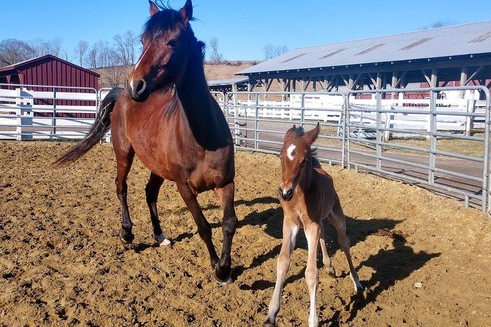While the horses graze in the pastures surrounding the Department of Animal Science facilities, they seem oblivious to the COVID-19 pandemic as their days simply hum along. Staff continue to work diligently caring for the animals, with the upmost attention being paid to their health and well-being.
“Every animal is being cared for and maintained in a healthy and well-managed environment,” says Steven Zinn, professor an department head. “We may have changed the way we operate to some degree, but nothing has been compromised. We have excellent employees—they all care about the animals and the job they are doing.”
The department’s livstock include 87 horses at the equine facilities; 200 dairy cattle, including 88 cows that are milked each day; 130 sheep; and 40 beef cows, as well as 600 chickens.
Agricultural businesses across the state are feeling the economic impact of this pandemic, and the same is true for the campus animal farms. The Dairy Bar and UConn Creamery remain closed, visitors are not permitted on campus, all horse riding lessons have been canceled and the markets have changed for farm products. There are not enough processors to bottle milk and produce milk products, and Zinn has had to find new avenues for egg sales.
 While the regular farm staff are considered essential employees, very few student workers are still on campus.
While the regular farm staff are considered essential employees, very few student workers are still on campus.
“In a normal year, we rely on 10,000 hours of student labor,” Zinn points out. “We have put together a very strict protocol about who is allowed to work, and we are following it.”
“Our daily operations have gone from eighteen student staff to four in the horse barns,” says Lisa Streff, lecturer and horse unit manager. “We keep the barns clean and routinely disinfect all contact points and equipment, and we make sure the students working practice social distancing. Sharon Aborn, our compliance coordinator, has been amazing with placing signs, closing the farm and having the public stay away to keep our student staff safe.”
The horses are no longer involved with teaching, training, riding or recreational programs. “We are focused on of all the horses and making sure they receive the daily care they need,” Streff says. “Once we found out Summer Session One will be online, we started discussing what we will do with the horses. They are happiest out in the field where they can maintain their fitness. When we are allowed to start riding them again, they will need reconditioning and retraining, just like any other athlete.”
 “The experiential learning side of the units has changed, but students still had eight weeks of classes before the shut down,” Zinn says. “We’ll figure out the rest of the year and will adjust. Eventually things will get back to normal.”
“The experiential learning side of the units has changed, but students still had eight weeks of classes before the shut down,” Zinn says. “We’ll figure out the rest of the year and will adjust. Eventually things will get back to normal.”
In the meantime, the four classes that Streff is teaching this semester have been converted to an online format. She is using video-based classes, blogs and group discussions.
She says, “This pandemic has definitely changed our daily way of life, but we are continuing to focus on maintaining a healthy environment for the horses and all of our staff.”
During the CAHNR Town Hall on Friday, May 8, Zinn extended a special thank you to all staff and students who have cared for the department’s animals during the pandemic.
They are:
Dairy, Livestock, Poultry Units
Mary Margaret Cole, Manager
Mary Kegler
Ag workers
Paul Bleimeyer
Jim Civitello
Jim Dunn
Audrey Grabber
Bedford Lawrence
Dave Macha
Bill Meister
Jeff Merli
Jason Merritt
Students
Melissa Hill
Katelyn Fegan
Katie Barber
Michaela Leishman
Ryan Blatchley
Briana Platania
Brook Shafer
Horse Units
Lisa Streff Manager
Kim Syme
Students
Kira Vigue
Julia Brower
Kaylee Carlisle
Angie Miller
Tori Couillard



